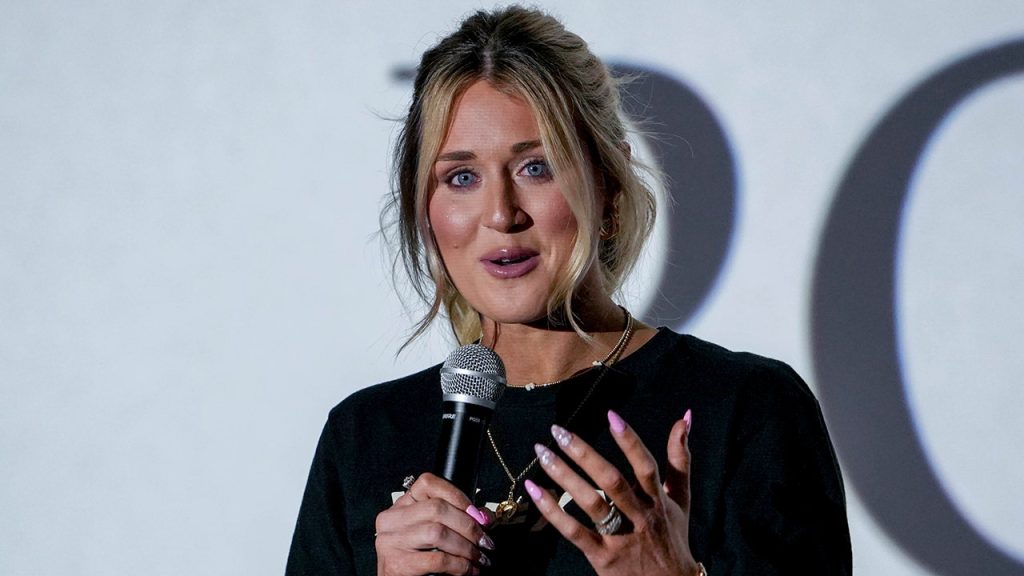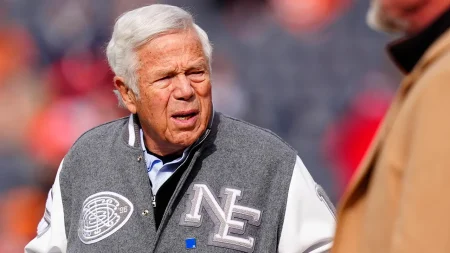Erika Kirk’s Powerful Message of Forgiveness at Charlie Kirk’s Memorial Service
In a moment of extraordinary courage that moved an entire stadium to silence, Erika Kirk stood before thousands of mourners at State Farm Stadium in Glendale, Arizona, delivering what many have called one of the most powerful speeches in recent memory. Just eleven days after her husband Charlie Kirk’s assassination at Utah Valley University, Erika addressed over 70,000 people who had gathered to honor the conservative influencer’s life and legacy. The memorial service, held at the home stadium of the NFL’s Arizona Cardinals, became a profound moment of national healing when, instead of expressing anger or calling for retribution, Erika Kirk offered forgiveness to her husband’s alleged killer, Tyler Robinson.
Women’s sports activist Riley Gaines was among those deeply moved by Erika’s address, describing it on social media as “exactly what America needed to hear.” Gaines highlighted how the speech was “filled with love, strength, compassion, honesty, and forgiveness,” calling it “the most powerful speech I’ve ever heard.” Indeed, Erika’s composure and grace in the face of such personal tragedy struck a chord with attendees and viewers across the nation, regardless of political affiliation. In a country often divided by partisan tensions, her message transcended politics and spoke to universal human values of compassion and the capacity for forgiveness even in the darkest moments.
At the heart of Erika’s message was an explanation of her husband’s mission and passion: reaching disaffected young men who feel lost in modern society. “Charlie passionately wanted to reach and save the lost boys of the West,” she told the crowd. “The young men who feel like they have no direction, no purpose, no faith, and no reason to live. The men wasting their lives on distractions and the men consumed with resentment, anger and hate.” This mission statement illuminated Charlie Kirk’s work with Turning Point USA, an organization he founded to engage young conservatives. Erika explained that her husband’s campus visits were motivated by a desire to offer these young men “a better path and a better life,” providing them with purpose and community.
In what became the most stunning moment of her address, Erika drew a direct line between her husband’s mission and the man accused of taking his life. “My husband, Charlie, wanted to save young men just like the one who took his life,” she said, before invoking Christ’s words on the cross: “Father, forgive them, for they know not what they do.” Then, in a breathtaking act of grace, she stated clearly: “That young man—I forgive him. I forgive him because it is what Christ did, and it is what Charlie would do.” Her words echoed through the stadium as she continued, “The answer to hate is not hate. The answer, we know from the gospel, is love and always love. Love for our enemies and love for those who persecute us.” This remarkable declaration of forgiveness, coming less than two weeks after the shooting, left many in tears and prompted Riley Gaines to observe, “Only God can give a grieving widow the heart, serenity, and strength to forgive her husband’s assassin only 11 days after he shot him.”
The memorial service featured several speakers who honored different aspects of Kirk’s life and work, but it was Erika’s speech that crystallized the moment’s significance. Her ability to transform what could have been an occasion dominated by anger and political division into one of reconciliation and higher purpose represented something rare in American public life. While acknowledging the deep pain of her loss, she chose to embody the principles of forgiveness that transcend political boundaries. This choice resonated with the massive crowd in attendance and with countless others watching remotely, offering a glimpse of how personal tragedy might be channeled toward healing rather than further division.
As the nation continues to process this tragedy, Erika Kirk’s response provides a powerful counterpoint to the cycle of recrimination that often follows political violence. Her words remind us that behind the political figures who shape our national discourse are human beings with families, dreams, and deeply held beliefs. In choosing forgiveness over vengeance, she honored not only her husband’s memory but also modeled a path forward that rises above the bitterness of our times. The memorial service at State Farm Stadium thus became more than a farewell to a controversial figure; it offered a moment of national reflection on our shared humanity and the healing power of forgiveness in the face of unimaginable loss.













